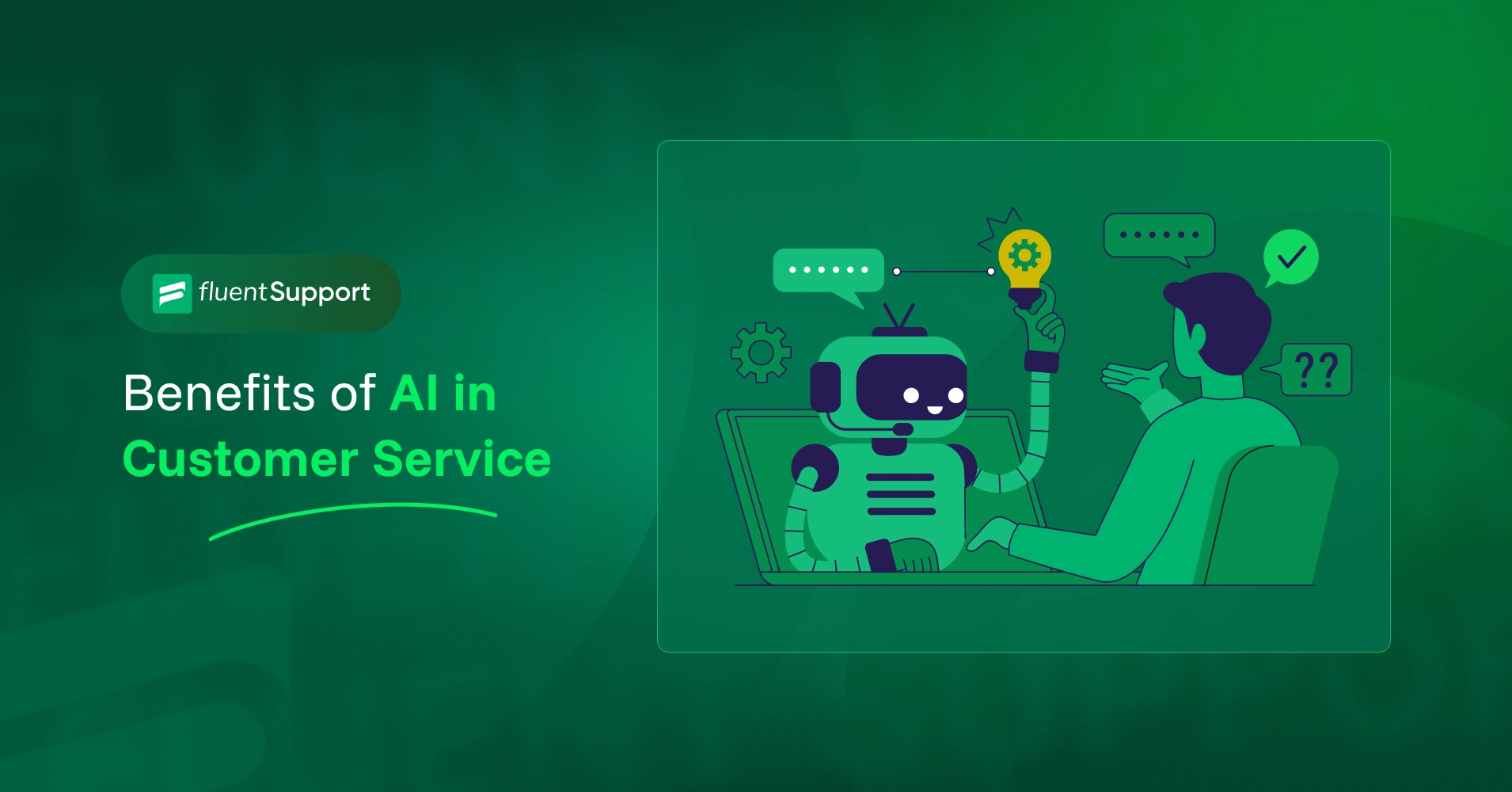
8 Practical Benefits of AI in Customer Service
By Md. Sajid Sadman
August 29, 2025
Last Modified: November 13, 2025
AI isn’t some future trend anymore. You’ve already seen it: chatbots popping up on websites, tools suggesting replies, or apps giving you instant answers. It’s become part of everyday customer service, whether you notice it or not.
With this shift happening all around us, it’s worth looking at the real benefits of AI in customer service.
In this blog, we’ll explore those benefits: how AI speeds up replies, makes support available 24/7, personalizes experiences, empowers human agents, and much more.
TL;DR
- AI in customer service is not just about faster replies. It makes support smarter, more consistent, and always available.
- With AI, businesses can stay online 24/7 and answer customer questions instantly without adding more overhead.
- It ensures consistency across every channel so customers always get the same reliable experience.
- Scalability becomes simple, helping companies handle more conversations without scaling costs.
- Agents are empowered with AI tools that reduce repetitive tasks and boost productivity.
- Every interaction becomes more personal with AI analyzing customer history, preferences, and behavior.
- Proactive support and sentiment tracking stop small frustrations from growing into bigger problems.
- Lastly, AI helps brands stand out by building a reputation for modern, customer-first service.
What is AI in customer service?
AI in customer service refers to the use of artificial intelligence technologies to streamline support, provide instant assistance, and personalize interactions while reducing repetitive manual work for agents. It makes service faster, more consistent, and more efficient for both customers and businesses.
In practice, this can look like chatbots answering simple questions, AI tools recommending replies during live chats, or sentiment analysis detecting customer frustration in real time. The goal is not to replace human agents but to support them, cut response times, and deliver a smoother customer experience.
So before diving into the benefits, keep this in mind: AI is essentially the extra teammate that never sleeps. It takes care of repetitive work in the background while letting your agents focus on conversations that actually need a human touch.
Benefits of AI in customer service (8 practical points)
AI isn’t here to replace customer service. It’s here to make it smarter.
So, what are the benefits of AI in customer service?
AI improves response speed, offers 24/7 support, and personalizes interactions. It empowers agents by handling routine tasks, providing real-time insights, and helping resolve issues faster, which leads to higher efficiency and customer satisfaction.
In this section, we’ll explore seven practical benefits that explain why AI has become a game-changer in customer service.
Okay, let’s get straight to the point.
1. 24/7 availability
One of the most practical benefits of AI in customer service is its ability to stay available around the clock. Unlike human agents who work in shifts, AI-powered chatbots and virtual assistants never take a break.
That means your customers can get answers to their questions at any time of day, regardless of the time zone.
And here’s the thing. Today’s customers don’t just like that; they expect it. Take a look at the stat reports regarding this.
Today’s customers don’t just want support. They expect it around the clock. In fact, 51% of people believe businesses need to be available 24/7 to meet modern expectations of convenience and accessibility. (Influx).
When customers reach out with a question, 90% say an immediate response is essential (and for many, “immediate” means within 10 minutes). (HubSpot)
The stark fact is that’s a high bar for any support team to meet. But with the benefits of AI (including in customer service), it becomes more possible. From order tracking to password resets and billing questions, AI takes care of the basics instantly.
The value goes way beyond convenience. Here’s what that really means for both customers and businesses:

Yes, day or night, AI makes sure customers are never left waiting. That kind of always-on support not only solves problems faster, it builds the kind of reliability customers remember and return for.
2. Consistency across channels
Modern customers don’t stick to just one channel when reaching out for support. They might start with a quick live chat, follow up through email, and later tag the brand on social media.
The problem is that without the right systems in place, the experience often feels disconnected.
A customer may get one answer on chat, a different one over email, and something else entirely on social media. That inconsistency can frustrate customers and weaken trust.
AI helps close this gap. By pulling data from a central knowledge base and using natural language processing, AI ensures that customers receive the same accurate information no matter where they reach out. Whether it’s chat, email, social, or even phone transcripts, the tone and accuracy remain consistent.
According to Salesforce, 75% of customers expect the same experience across multiple channels.
When answers align, customers feel reassured that your brand knows them and values their time. On the business side, it strengthens brand identity and prevents agents from repeating work or sending mixed messages.
The impact is simple. Customers move between channels without feeling like they are starting over, and businesses deliver a seamless, reliable service experience that keeps people coming back.
3. Scalability and cost efficiency
As a business grows, customer conversations grow with it. Scaling a support team the traditional way often means hiring and training more agents, which adds costs and delays. This approach can work for a while, but it quickly becomes difficult to sustain.
That’s where AI changes the game. Instead of relying on headcount, it can handle thousands of routine queries at once without sacrificing speed or quality.
This flexibility becomes especially valuable during high-demand periods like holiday sales, subscription renewals, or sudden product launches. While human teams often hit their limits, AI systems manage surges with ease and keep response times short.
As a result, customers feel valued with quicker replies, and businesses protect the trust they’ve worked hard to build.
This scalability naturally leads to another big benefit: cost efficiency. AI reduces the need for large frontline teams by taking care of repetitive tasks such as password resets, shipping updates, or simple troubleshooting. This allows businesses to save on staffing costs while investing resources into more complex, high-value interactions that truly need a human touch.
What makes this even more powerful is that AI scales both ways. It adapts when demand spikes, but it also prevents overspending when demand slows. AI systems do this by automatically managing the volume of routine queries, taking on more when traffic is high and scaling back when it’s low, without any extra cost.
Research suggests that AI in customer service can cut costs by 20–30% while improving efficiency across the board.
Yes, for businesses that operate in multiple markets or time zones, this combination of scalability and cost savings is more than a convenience. It becomes a long-term strategy for sustainable growth.
And that’s why you need to be aware of the benefits of AI in customer service and incorporate it into your business or service.
So let me introduce you to an AI-enhanced customer support system for WordPress that comes with no growth tax and scales without draining your budget.
Fluent Support!
With this system, you don’t pay more just because your conversations grow. You keep costs predictable while your service keeps getting smarter.
4. Faster responses and quicker resolution
Speed is one of the biggest drivers of customer satisfaction. Nobody wants to wait hours in a queue or days for a reply. That is why tracking and improving First Response Time (FRT) has become such a crucial benchmark in customer service. If your FRT is high, chances are your customers are already feeling frustrated before the real conversation even begins.
AI helps bring this number down. Chatbots can instantly answer simple queries like shipping updates or password resets, which means customers get their first response within seconds. For more complex cases, AI can route the ticket to the right person, summarize the issue, and even provide suggested replies.
That not only lowers response time but also reduces Average Handling Time (AHT), since agents spend less effort digging for context and more time solving the actual problem.
The final piece is Mean Time to Resolution (MTTR), which measures how long it takes to fully resolve an issue. With AI streamlining responses and cutting down handling times, the overall resolution cycle becomes shorter.
Customers don’t just get faster replies. They see their problems closed out quicker, which is what truly shapes their experience.
The benefits are twofold. Customers feel valued because their problems are handled quickly, and businesses see measurable improvements across FRT, AHT, and MTTR. Over time, these gains add up to faster resolutions, happier customers, and stronger loyalty.
5. Agent empowerment and productivity
Up until now, the focus has been on how AI improves the customer experience. But the benefits go deeper. AI also transforms the way agents work, giving them the tools to be more efficient, confident, and less overwhelmed by routine tasks.

By taking care of repetitive requests like FAQs, order updates, or password resets, AI frees agents to focus on conversations that require problem-solving and empathy. This shift not only improves customer satisfaction but also makes an agent’s daily workload far more engaging.
Here’s how AI supports agents in practical ways:
Just consider the number, AI augmentation can increase productivity by up to 14%.
But the real advantage goes beyond the numbers. Empowered agents stay motivated, deliver better service, and are less likely to leave their roles. Retaining skilled agents is just as valuable as keeping customers happy.
So yes, AI helps on both fronts, and that really holds practical benefits!
6. Personalization and better insights
Customers expect brands to know them.
In fact, 71% of consumers say they feel frustrated when an experience is impersonal (McKinsey).
Here, using AI in your service can be your winning move. It can analyze customer data (consumer behavior) and tailor responses at a scale your human customer support team could never match.
No, AI doesn’t just stop at scale. It uses this data to make interactions feel truly personal. It can track preferences, purchase history, and past interactions to shape more personal conversations.
For example, instead of a generic response, an AI system can remind a returning customer about a previous order or suggest a product that fits their past buying patterns. These small touches create a sense of recognition that customers value.
But personalization is only half of the story.
AI also generates insights that help businesses understand their customers better. By spotting trends across thousands of conversations, AI can highlight common issues, recurring complaints, or opportunities for upselling. This kind of visibility allows teams to adjust processes, improve products, and proactively address customer needs.
Let’s have a quick glimpse of what AI brings to the table:
The outcome is simple. Customers feel understood, businesses gain clarity, and both sides benefit from interactions that are faster, more personal, and more meaningful.
7. Proactive support and customer sentiment
Most customer service today is reactive. Agents wait until a customer complains before stepping in. The problem is that by the time a complaint shows up, frustration has already built up(in multiple cases), and it’s a bit harder to recover the relationship.
Well, AI can change this scenario by making support proactive. It can analyze behavior patterns to predict when issues are likely to occur and step in before customers even think about reaching out.
Here’s a nice example for this one:
If a customer is browsing a help article and keeps searching for the same issue without finding an answer, AI can step in with a live chat prompt offering direct help. Instead of waiting for the customer to get frustrated and leave, the brand reaches out first. That proactive step makes customers feel supported and reduces the chance of losing them to confusion.
AI also makes it possible to understand customer emotions in real time. During a chat or email, it can detect frustration in the tone of a message and flag it for the agent. This gives the team a chance to respond with empathy and resolve the issue before it gets worse.
Look at Fluent Support’s AI-powered sentiment analysis feature. The feature shows agents a quick snapshot of how a customer is feeling (positive, negative, or neutral).
So to sum up, these small interventions add up to stronger loyalty because customers feel understood rather than ignored.
8. Brand differentiation through AI strategy
Lastly, one of the biggest benefits of AI in customer service is how it helps brands stand out.
In crowded markets, products and prices often look similar. Here, what really makes the difference is the experience customers have with your brand. A big part of that experience comes from the quality of service, and AI gives you the chance to turn it into a competitive edge.
The real advantage appears in how service is delivered. A brand that offers instant answers through chatbots, sends proactive updates when an order is delayed, and gives personalized recommendations based on past purchases immediately feels more reliable than one that leaves customers waiting. These small but consistent touches turn customer service from a support function into a key part of brand identity.
AI also plays a role in long-term positioning. Customers notice when a company invests in modern tools to improve their experience. Over time, that creates a reputation for being innovative, responsive, and trustworthy. Many leading brands now compete as much on experience as they do on product features or price, and AI makes that possible.
I know it might sound like a stretch that AI alone can help a brand stand out. But let’s give you a real-world example of it.
Klarna, the Swedish fintech giant, introduced an AI chatbot that now handles about two-thirds of all customer inquiries. That equals the work of nearly 700 agents. It cut response times from 11 minutes to under 2 minutes and boosted profitability by around $40 million a year. While the AI handles routine queries, human agents are freed to focus on complex cases, giving Klarna a customer experience that feels both fast and human.
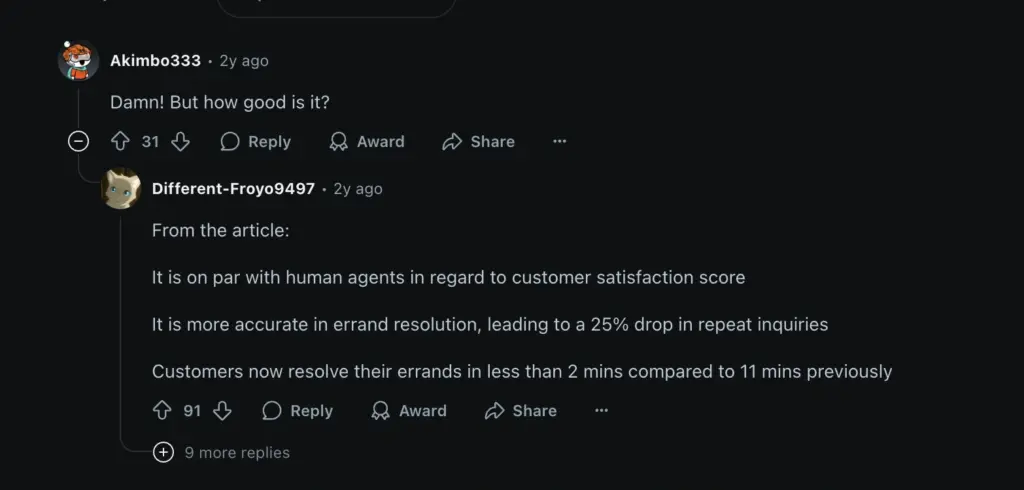
That’s how Klarna stood out from many of its competitors and built a brand name recognized for fast, reliable, and customer-first service.
In the end, AI is not just about efficiency. It is about shaping a customer journey that feels modern, personal, and well thought out. That kind of differentiation is what builds loyalty and keeps customers coming back, even when they have plenty of other options.
Wrapping up
So now you have the practical benefits of AI in customer service. It is not just about saving time or cutting costs. It is about showing up for customers, staying consistent, and making support feel personal.
AI is already helping businesses reply faster, empower agents, and stand out from the crowd. These are real wins, not future promises.
The takeaway is simple. AI isn’t here to replace customer service. It is here to make it smarter, faster, and more meaningful for both customers and businesses.
Start off with a powerful ticketing system that delivers smooth collaboration right out of the box.






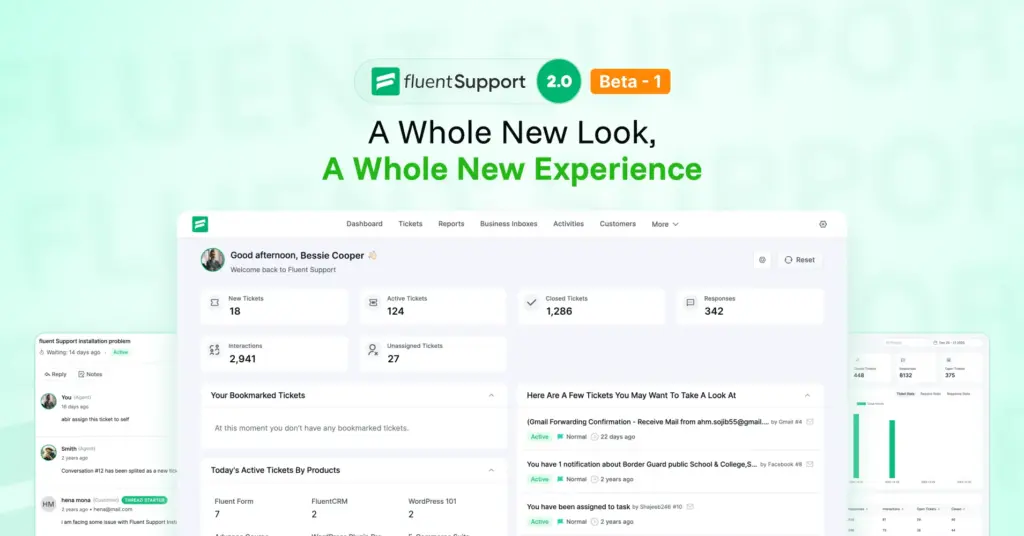
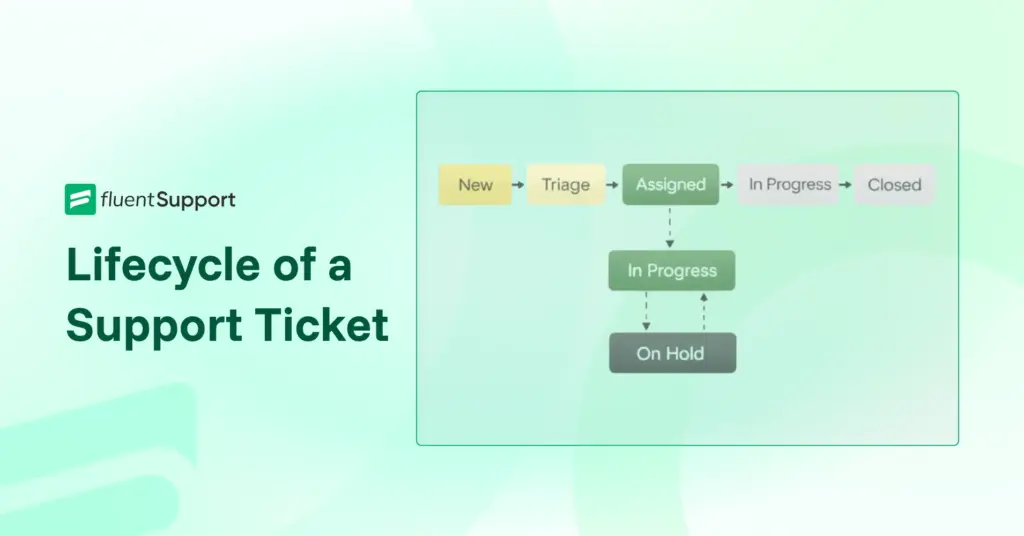


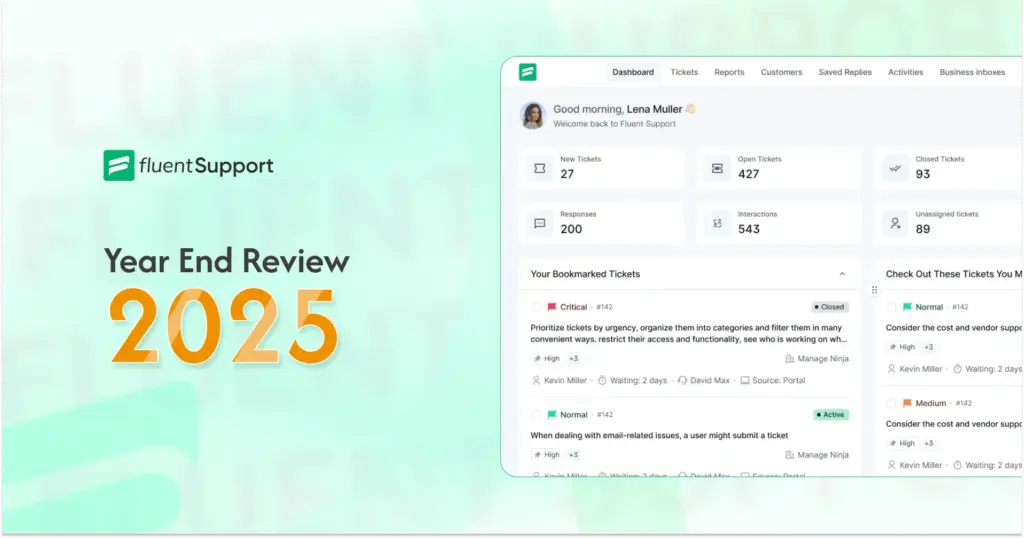

Leave a Reply